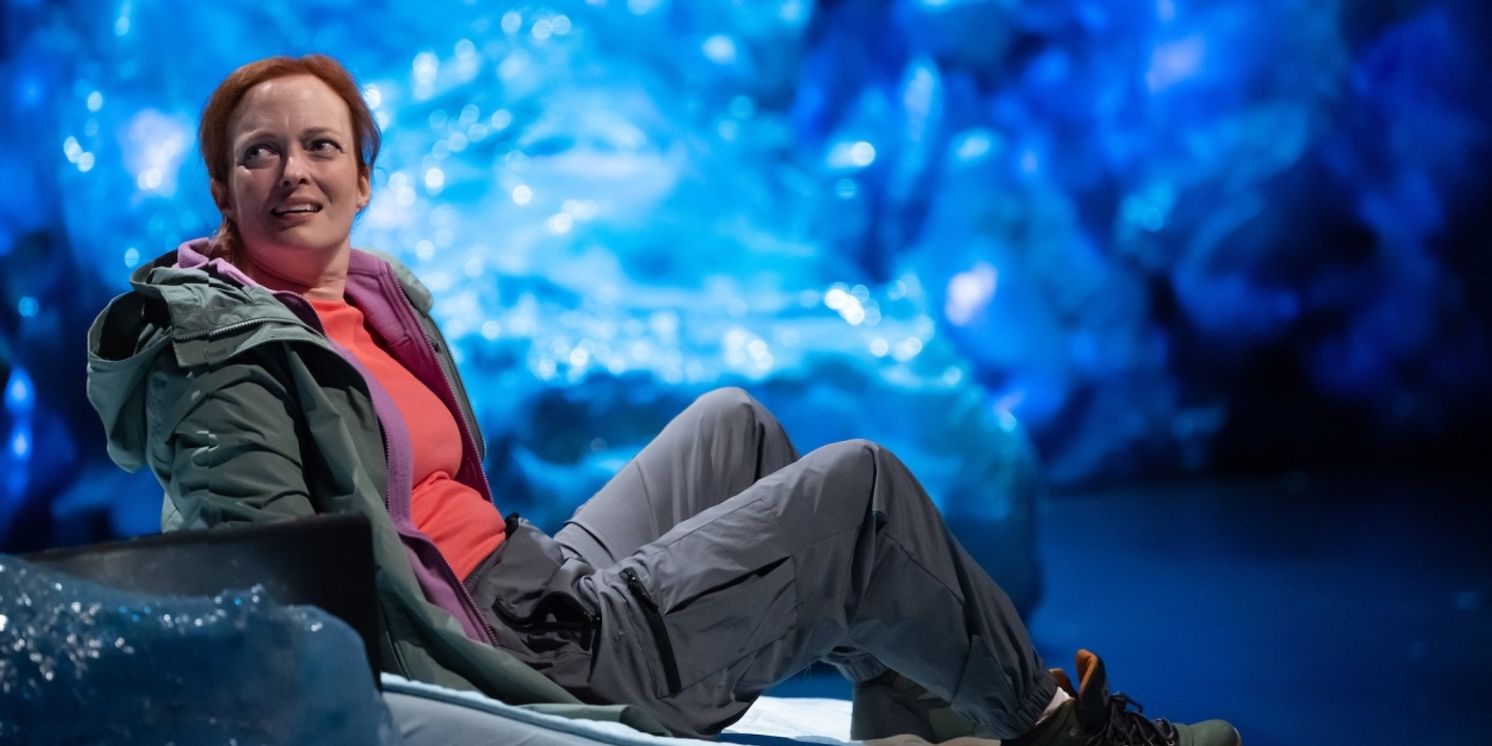Review: USHUAIA BLUE an Immersive, Deep Environmental Dive at CATF
Contemporary American Theater Festival's USHUAIA BLUE a Fascinating Tone Poem Dedicated to Antarctica & The Environment

Settling back into the rhythms of the Contemporary American Theater Festival, one of the great pleasures is to return to their dedicated theatre-in-the-round space, the Marinoff. Designers- let's leave aside the actual play for a moment-have a field day creating unforgettable, immersive experiences that will remain in your memory lock'd for years. The expectations, just stepping into the space after our COVID-imposed hiatus, were quite high.
And rewarded, too. Jessi D. Hill's production of "Ushuaia Blue" offers us a performance piece that is part tone poem, part personal tragedy, part environmental meditation. Shifting with ease from one time and place, and from one frame of mind, to another, the cast offers us a glimpse of how our understanding of global climate change needs to expand-beyond the microscopes and bathyscaphes, beyond the labs, beyond those cute penguins, and out onto the ever-more-endangered ice of Antarctica.
The soundscape for "Ushuaia Blue" alone places you in a world that is rapidly falling apart. The ice creaks, discreetly at first; there's the low hum of incipient chaos that permeates the space, thanks to David Remedios' sound design and occasional music by Broken Chord. Combined with the floor projections of ice floes, designed by Tennessee Dixon, (who also tantalizes us with vanishing word-floes as well), the effect is one of taking you beyond the words. Yes, there's a play; but even as the characters talk they continue to point to the conversation that nature is having with us. It's been one-sided for ages, with us scarcely listening; by the end of the evening, your ears will be fully open to what the ice has to say.
Svich uses a personal tragedy as the focus of the dialogue-a scientist whose wife has a medical emergency, while they are staying together in Antarctica; as a result, she lies in a hospital bed (in the main land), in a deep coma for months. As the husband, Jordan, John Keabler gives us a solid, privileged character, who owes his career to his family's oil money, all the while knowing that it is his family fortune which lies behind the crisis his wife Sara (the magnetic Kelley Rae O'Donnell) insists on exploring, in her own way.
Two parallel scenes play out, as we watch Jordan and Sara's complicated relationship unfold. Three friends of the couple comment on the meaning and potential outcome of Sara's coma, looking every bit like a Tragic chorus, each offering highly divergent views on what to think.
Meanwhile, by far the most compelling sequence involves Sara's encounters with Pepa, an indigenous woman of Ushuaia whose knowledge of the environment, and of its wildlife, surpasses Jordan's by miles. It is Pepa who inspires Sara to explore Antarctica and to pay close attention to the environment, the ice, and the sub-glacial streams which are the harbingers of disaster to come. Amelia Rico's turn as Pepa becomes the centerpiece of this environmental drama, and she persuades us to pay even closer attention to the production team's soundscape as the evening progresses. It's not just stage-craft at all.
Jesse Dreikosen's set consists of what appear at first to be islands of ice, which upon closer inspection are made from jumbles of plastic, the detritus of our times, forming deadly clusters in the world's oceans. Studded with laptops and cellphones, the tools of the trade, these islands of junk and virtual knowledge provide their own commentary. Moyenda Kulemeka assembles a highly diverse set of costumes, placing us now in the American south, now in an indigenous woman's house, now in the confines of a research station.
"Ushuaia Blue" has the potential to inspire and to open up our senses in ways we haven't even tried before. It's a journey like few others.
Production Photo: Kelley Rae O'Donnell in the world premiere of Ushuaia Blue by Caridad Svich. Photo by Seth Freeman.
Running Time: 90 minutes without Intermission.
Ushaia Blue runs as a part of the Contemporary American Theatre Festival, through July 31 in the Marinoff Theatre at Shepherd University in Shepherdstown, West Virginia.
For tickets visit https://catf.org/buy-tickets/ . You can also email the box office at boxoffice@catf.org or call them at 681-240-2283.
Reader Reviews
Videos

